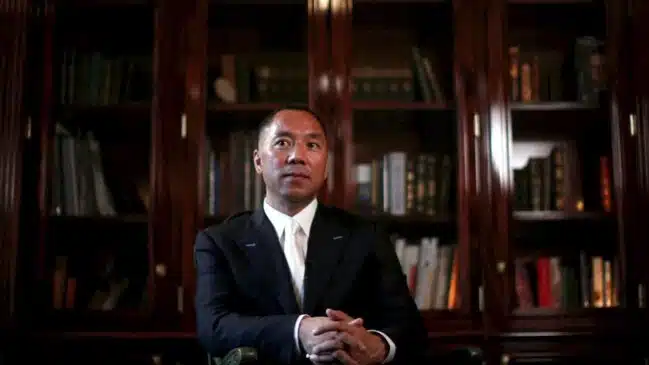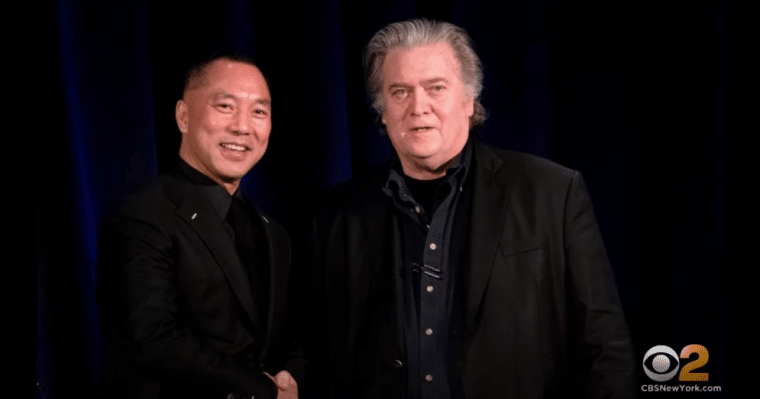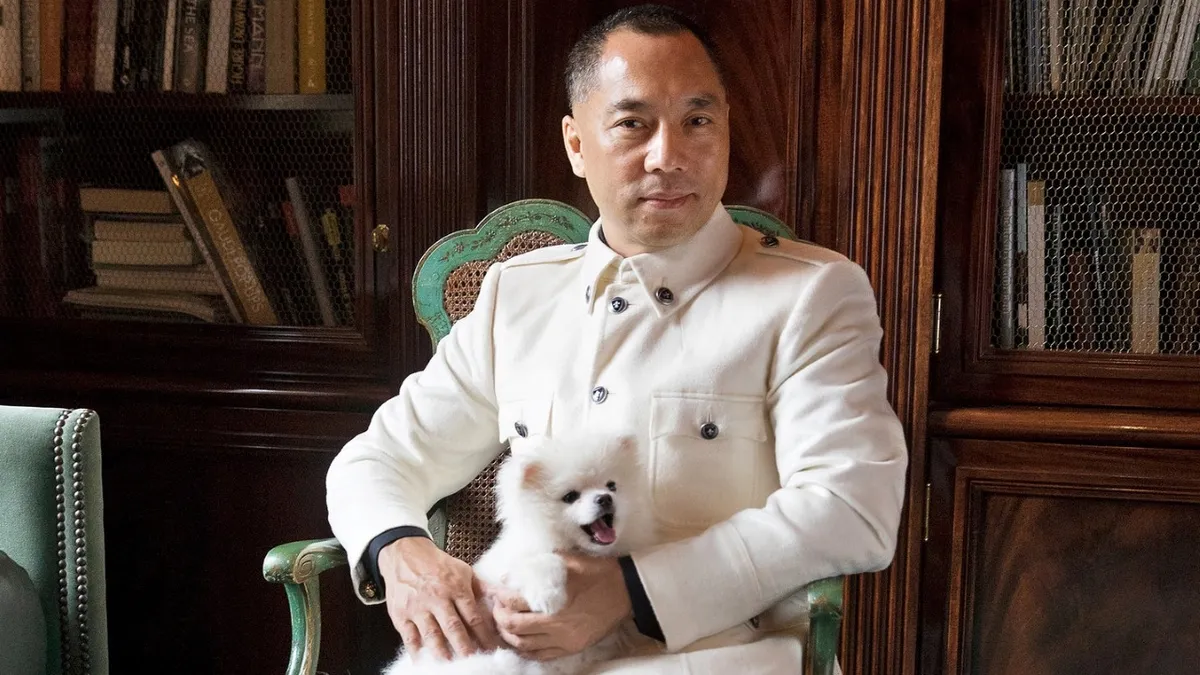A self-exiled Chinese businessman known as Guo Wengui was convicted this week for running a fraudulent scheme involving over $1 billion in investors’ funds. For seven weeks, a jury of peers deliberated and finally found the tycoon guilty of nine out of twelve charges including wire fraud and money laundering.
Guo, who also goes by the name Ho Wan Kwok, faced a trial in New York City after years of investigations by law enforcement agencies. He was known for being a vocal critic of the Chinese Communist Party (CCP) and had ties with prominent figures in the United States political landscape.
District Judge Analisa Torres scheduled a sentencing hearing for Guo for November this year. He faces decades in jail if the judge chooses to apply the maximum punishment for the many counts he has been convicted of.
Chinese Dissidents Were Lured to Guo’s Scheme Amid His Anti-CCP Discourse

According to prosecutors, Guo promoted multiple fraudulent schemes that allowed him to harness over $1 billion from investors from 2018 to 2023. He offered investment opportunities in the crypto space and ran a hedge fund. There are thousands of different scams like this but almost none of them manage to bring in so much cash.
The Chinese fraudster used his robust social media presence to entice other Chinese dissidents living in the United States and other countries and repeatedly criticized the CCP to gain their support.
He reportedly used phrases like “I’m rich. I’ll take care of you,” and other similar promises to get people to invest money with him and also said that he would use some of the funds to finance activities against the CCP in his home country.
However, Guo did not fulfill any of these promises and, instead, used the money to fund a lavish lifestyle. Among his many eccentric purchases, prosecutors listed $1 million worth of premium rugs and a $37 million yacht.
Thousands of victims fell prey to Guo’s investment scheme. Many of them were lured by his anti-CCP discourse but soon found out that, in reality, he had zero interest in politics. One victim who spoke in anonymity to BBC due to fears of retaliation by loyal Guo followers said that she invested $6,000 after watching some of his livestreams.
Also read: Millions Are Being Lost to Celebrity Scams: Here’s How to Stay Safe
“Thousands of Guo’s online followers were victimized so that Guo could live a life of excess,” commented Damian Williams, US Attorney for the Southern District of New York.
Meanwhile, another person said that his rhetoric against the CPP “won the hearts of many.” This victim invested over $50,000 and was ultimately defrauded.
“When he began speaking out in 2017 and granted interviews to media outlets, he was quickly able to build a following by spilling the tea on the Chinese Communist Party,” said Kyle Weiss, an analyst at Graphika, a company that provides insightful analytics about social media platforms.
Guo Had Strong Political Connections

The Securities and Exchange Commission (SEC) played a significant role in uncovering Guo’s fraudulent activities. In 2021, Guo was forced to pay $539 million to settle a lawsuit filed by the SEC, which alleged that he had illegally sold cryptocurrency and stock in GTV Media Group to investors.
The actions of the Securities and Exchange Commission (SEC) were critical to apprehend and dismantle Guo’s operations. In 2021, the agency forced him to pay $539 million to settle a lawsuit against his company GTV Media Group for promoting and selling unregistered securities to investors.
Moreover, Guo partnered with another Chinese individual named King Ming Je to expand his operations to London. Je is being accused of helping Guo promote the scheme and run a hedge fund that made reckless bets.
In addition, the trial uncovered Guo’s connection with political figures who had ties to the former United States president, Donald Trump. Steve Bannon, a former top Trump advisor and renowned scammer, was one of those people. He was filmed promoting one of Guo’s investments during a press conference in 2018. Bannon was arrested in 2020 for his involvement in a fraud case. He set up a fundraiser to help “build the wall” but he (allegedly) just took the money for himself. He was ultimately pardoned by Trump a few months later but Guo will not be as lucky.
Guo Targeted Fellow Chinese Dissidents by Calling Them CCP Spies
Guo was born in 1970 in a Chinese province named Shandong. He grew up poor but managed to find a path to wealth by operating in the real estate market. However, in 2014 he escaped from China after becoming a target for the CCP during an anti-corruption crackdown.
Also read: Fraudsters Who Stole $250 Million Tried to Bribe a Juror With $120,000 in Cash
Once in the US, he started to raise his voice against the CCP’s practices and gained a large online following as a result. At some point, he launched a campaign called “punishing the traitors” that targeted Chinese dissidents who were allegedly spying on their peers while in the United States.
He started to name names and, soon, some unwary Chinese folks were caught up in the narrative. A professor from the University of Chicago named Teng Biao was one of the victims of this practice.
After Guo claimed that he was CCP spy, people started to gather outside his home in New Jersey to protest. He received death threats and was harassed constantly in the streets.
“They were standing in front of my house and holding banners and signs calling me a [Chinese Communist Party] spy and they kept filming my house, livestreaming, and cursing me and my children and my family,” Teng commented recently.
A person who was involved in Guo’s operations claimed that many of his followers are hesitant to accuse him as he managed to gather sensitive information from them including their names, passports, addresses, and phone numbers. They fear that Guo could leak this information to the CCP and anti-CCP radicals.
Also read: FBI Busts Las Vegas Scammer Idin Dalpour Who Stole $43M from Investors Through Ponzi Scheme
In 2022, Guo declared bankruptcy and claimed that he had less than $100,000 in total assets. Law enforcement agencies continue to investigate the many organizations, investment funds, and other schemes tied to Guo.
The Chinese fraudster has denied all allegations and his defense team has said that all of these accusations are “fabricated and unwarranted”. They claimed that the trial was influenced by the Chinese Communist Party (CCP) but failed to provide any tangible evidence that it was.
The conviction of Guo Wengui marks the end of a complex fraudulent scheme that exploited political tensions and the trust of thousands of investors. As Guo awaits sentencing, the case sounds the alarm on the potential that charismatic figures have to manipulate followers for their personal gain, even while championing seemingly noble causes.
